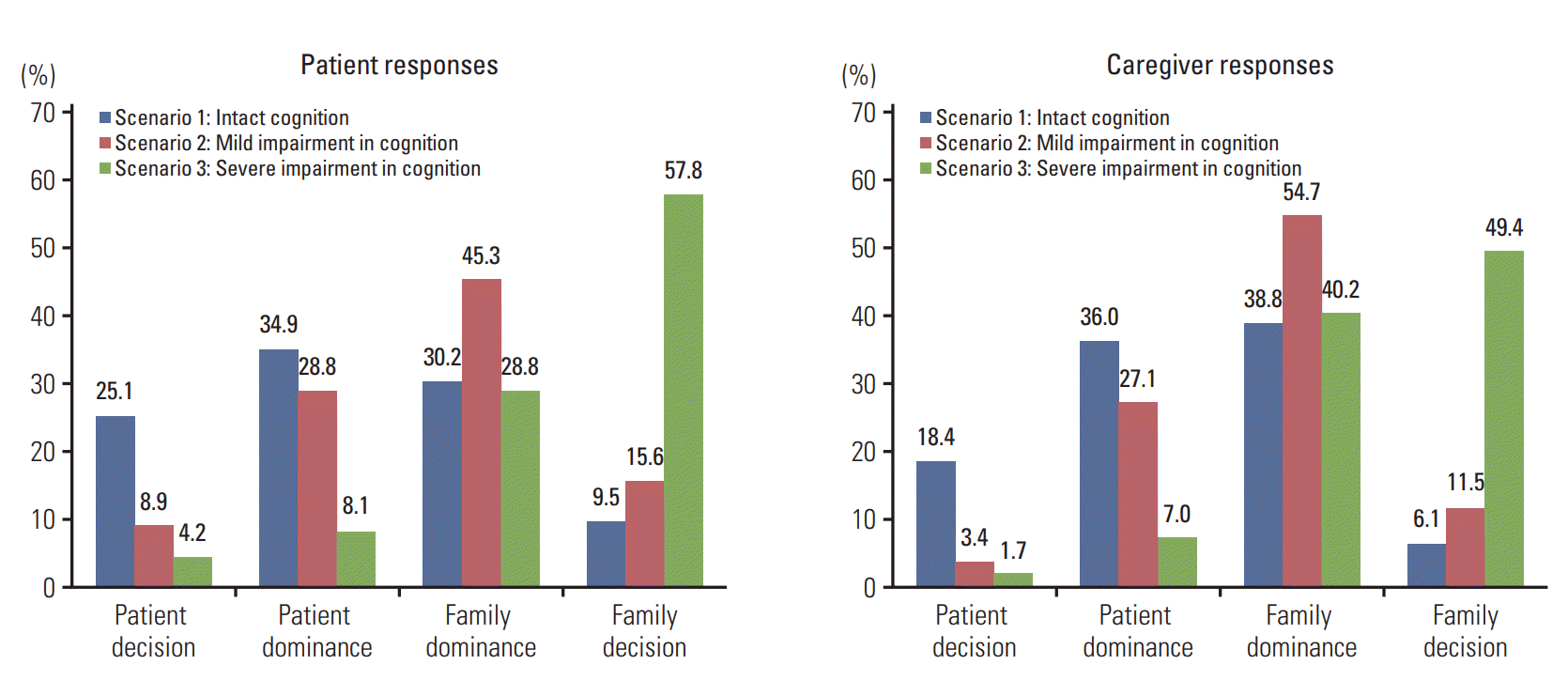1. Hamann J, Bronner K, Margull J, Mendel R, Diehl-Schmid J, Buhner M, et al. Patient participation in medical and social decisions in Alzheimer's disease. J Am Geriatr Soc. 2011; 59:2045–52.

2. Sharma RK, Hughes MT, Nolan MT, Tudor C, Kub J, Terry PB, et al. Family understanding of seriously-ill patient preferences for family involvement in healthcare decision making. J Gen Intern Med. 2011; 26:881–6.

3. Nolan MT, Hughes M, Narendra DP, Sood JR, Terry PB, Astrow AB, et al. When patients lack capacity: the roles that patients with terminal diagnoses would choose for their physicians and loved ones in making medical decisions. J Pain Symptom Manage. 2005; 30:342–53.

4. Caillet P, Canoui-Poitrine F, Vouriot J, Berle M, Reinald N, Krypciak S, et al. Comprehensive geriatric assessment in the decision-making process in elderly patients with cancer: ELCAPA study. J Clin Oncol. 2011; 29:3636–42.

5. Molina-Garrido MJ, Guillen-Ponce C. Development of a cancer- specific comprehensive geriatric assessment in a university hospital in Spain. Crit Rev Oncol Hematol. 2011; 77:148–61.
6. Grosshans DR, Meyers CA, Allen PK, Davenport SD, Komaki R. Neurocognitive function in patients with small cell lung cancer: effect of prophylactic cranial irradiation. Cancer. 2008; 112:589–95.
7. Schagen SB, Boogerd W, Muller MJ, Huinink WT, Moonen L, Meinhardt W, et al. Cognitive complaints and cognitive impairment following BEP chemotherapy in patients with testicular cancer. Acta Oncol. 2008; 47:63–70.

8. Chen X, Zhu C, Li J, Qiu L, Zhang L, Yu F, et al. Dissociation of decision making under ambiguity and decision making under risk in breast cancer patients receiving adjuvant chemotherapy: a neuropsychological study. Brain Res. 2013; 1533:63–72.

9. Shin DW, Cho J, Roter DL, Kim SY, Sohn SK, Yoon MS, et al. Preferences for and experiences of family involvement in cancer treatment decision-making: patient-caregiver dyads study. Psychooncology. 2013; 22:2624–31.

10. Shin DW, Cho J, Roter DL, Kim SY, Yang HK, Park K, et al. Attitudes toward family involvement in cancer treatment decision making: the perspectives of patients, family caregivers, and their oncologists. Psychooncology. 2017; 26:770–8.

11. Degner LF, Sloan JA, Venkatesh P. The Control Preferences Scale. Can J Nurs Res. 1997; 29:21–43.
12. Makoul G, Clayman ML. An integrative model of shared decision making in medical encounters. Patient Educ Couns. 2006; 60:301–12.

13. Harzing AW, Brown M, Koster K, Zhao S. Response style differences in cross-national research. Manag Int Rev. 2012; 52:341–63.

14. Wolfs CA, de Vugt ME, Verkaaik M, Haufe M, Verkade PJ, Verhey FR, et al. Rational decision-making about treatment and care in dementia: a contradiction in terms? Patient Educ Couns. 2012; 87:43–8.

15. Hirschman KB, Xie SX, Feudtner C, Karlawish JH. How does an Alzheimer's disease patient's role in medical decision making change over time? J Geriatr Psychiatry Neurol. 2004; 17:55–60.

16. Miller LM, Whitlatch CJ, Lyons KS. Shared decision-making in dementia: a review of patient and family carer involvement. Dementia (London). 2016; 15:1141–57.

17. Ishikawa H, Roter DL, Yamazaki Y, Hashimoto H, Yano E. Patients' perceptions of visit companions' helpfulness during Japanese geriatric medical visits. Patient Educ Couns. 2006; 61:80–6.

18. Hirschman KB, Joyce CM, James BD, Xie SX, Casarett DJ, Karlawish JH. Would caregivers of Alzheimer disease patients involve their relative in a decision to use an AD-slowing medication? Am J Geriatr Psychiatry. 2005; 13:1014–21.

19. Karel MJ, Moye J, Bank A, Azar AR. Three methods of assessing values for advance care planning: comparing persons with and without dementia. J Aging Health. 2007; 19:123–51.
20. Karlawish JH, Casarett D, Propert KJ, James BD, Clark CM. Relationship between Alzheimer's disease severity and patient participation in decisions about their medical care. J Geriatr Psychiatry Neurol. 2002; 15:68–72.

21. Samsi K, Manthorpe J. Everyday decision-making in dementia: findings from a longitudinal interview study of people with dementia and family carers. Int Psychogeriatr. 2013; 25:949–61.

22. Feinberg LF, Whitlatch CJ. Are persons with cognitive impairment able to state consistent choices? Gerontologist. 2001; 41:374–82.

23. de Boer ME, Droes RM, Jonker C, Eefsting JA, Hertogh CM. Thoughts on the future: the perspectives of elderly people with early-stage Alzheimer's disease and the implications for advance care planning. AJOB Prim Res. 2012; 3:14–22.

24. MacQuarrie CR. Experiences in early stage Alzheimer's disease: understanding the paradox of acceptance and denial. Aging Ment Health. 2005; 9:430–41.

25. Hirschman KB, Joyce CM, James BD, Xie SX, Karlawish JH. Do Alzheimer's disease patients want to participate in a treatment decision, and would their caregivers let them? Gerontologist. 2005; 45:381–8.

26. Grisso T, Appelbaum PS. The MacArthur Treatment Competence Study. III: Abilities of patients to consent to psychiatric and medical treatments. Law Hum Behav. 1995; 19:149–74.

27. Hilgeman MM, Allen RS, Snow AL, Durkin DW, DeCoster J, Burgio LD. Preserving Identity and Planning for Advance Care (PIPAC): preliminary outcomes from a patient-centered intervention for individuals with mild dementia. Aging Ment Health. 2014; 18:411–24.

28. Murphy J, Oliver T. The use of Talking Mats to support people with dementia and their carers to make decisions together. Health Soc Care Community. 2013; 21:171–80.

29. Whitlatch CJ, Judge K, Zarit SH, Femia E. Dyadic intervention for family caregivers and care receivers in early-stage dementia. Gerontologist. 2006; 46:688–94.

30. Tariman JD, Berry DL, Cochrane B, Doorenbos A, Schepp K. Preferred and actual participation roles during health care decision making in persons with cancer: a systematic review. Ann Oncol. 2010; 21:1145–51.






 PDF
PDF Citation
Citation Print
Print


 XML Download
XML Download